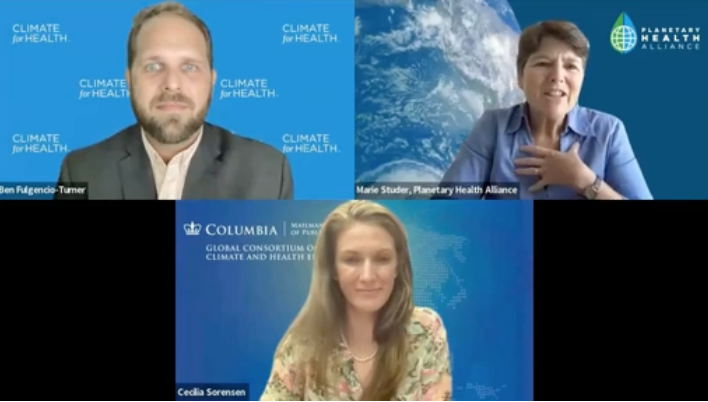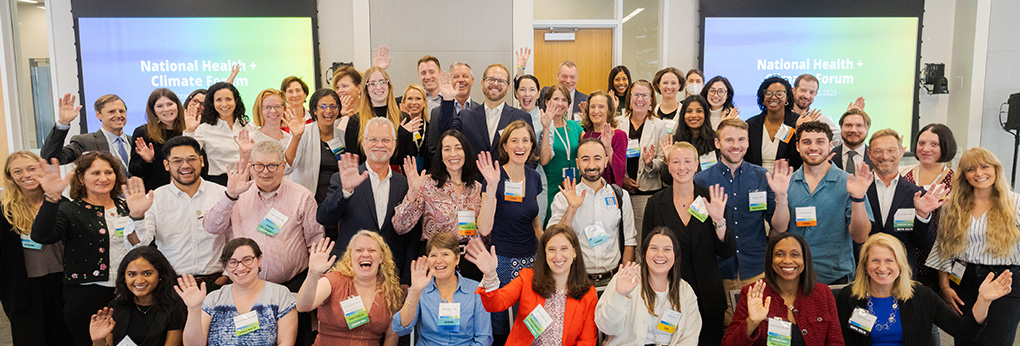

National Health + Climate Forum 2023 Highlights
The National Health + Climate Forum on September 20, 2023, brought together national, state, and local leaders from across health disciplines to share the latest updates, best practices, and opportunities for engagement, collaborate on strategies to accelerate climate action and advocacy, and commit to just and equitable climate solutions that protect health — locally and nationally.
Collective Impact Working Session: Recommendations | Moving Forward Working Session: Recommendations
Welcome
Welcome from Lynn Goldman, MD, Michael and Lori Milken Dean of Public Health, Milken Institute School of Public Health, and Ben Fulgencio-Turner, Director, Climate for Health.
Watch the recording, HERE
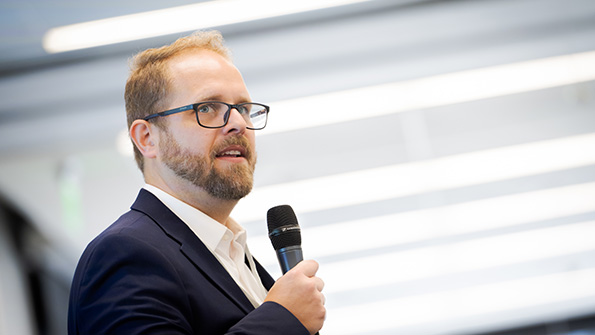

Making a Difference
We have progress to celebrate and work to do. Senator Ed Markey (D-MA) and Bob Perkowitz, President of ecoAmerica, shared the status and outlook for federal climate solutions and how local action from health professionals is needed to drive transformation.
Watch the session recording, HERE
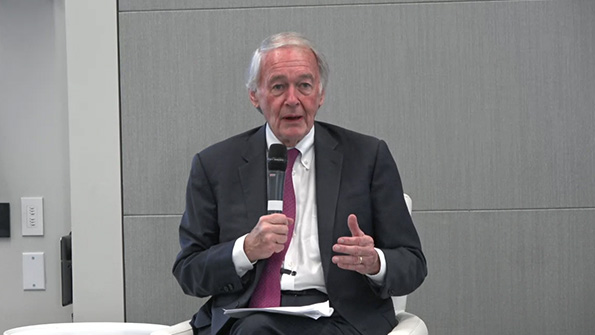

Climate Solutions are Equity Solutions
Our problems are intersectional and our solutions must be as well. We have an incredible opportunity to take action on climate, repair harms to marginalized and vulnerable communities, and prevent future injustices. Hear about solutions that help limit the impacts of climate change while addressing persistent disparities.
Speakers
Georges C. Benjamin, MD, Executive Director, American Public Health Association
Natasha DeJarnett, PhD, MPH, BCES, Deputy Director of Environmental Justice Data and Evaluation, White House Council on Environmental Quality
Jacqui Patterson, Founder and Executive Director, The Chisholm Legacy Project
Watch the session recording, HERE
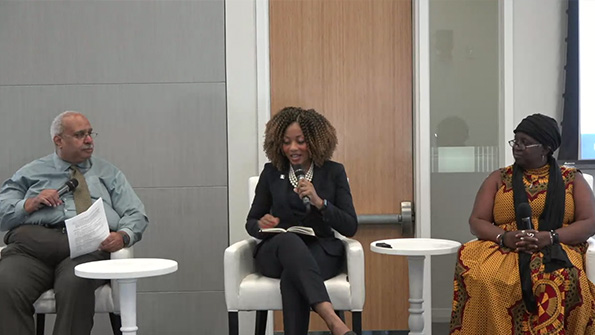

Core Climate Initiatives in Health Care
From policy advocacy to impact reduction, research, and education, health professionals have unique opportunities to accelerate climate solutions. Learn about the latest initiatives from national climate and health leaders, and how you can participate.
Speakers
Antonia Herzog, PhD, Director of Climate Policy and Advocacy, Health Care Without Harm
Lisa Patel, MD, MESc, Executive Director, Medical Society Consortium on Climate and Health
Meighen Speiser, Executive Director, ecoAmerica
Neelima Tummala, MD, Clinical Assistant Professor of Surgery and Co-Director of the Climate Health Institute, George Washington University School of Medicine and Health Sciences
Watch the session recording, HERE
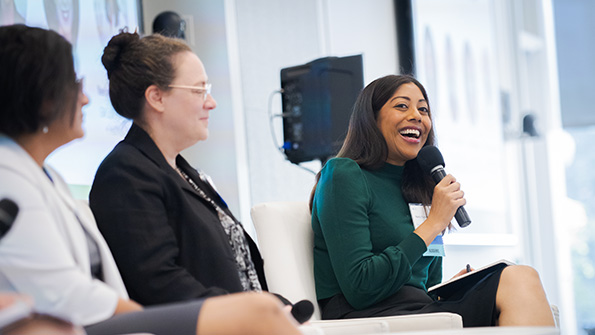

Children’s Mental Health in a Changing Climate
Children are one of the most vulnerable populations to the impacts of climate change, especially related to mental health. Learn about new research and resources to protect children’s health as our climate changes, and help others do the same.
Speakers
Samantha Ahdoot, MD, Chair, Virginia Clinicians for Climate Action
Ben Fulgencio-Turner, Director, Climate for Health
Leyla McCurdy, MPhil, Chair, Climate for Health Executive Committee, ecoAmerica; Chair, Children’s Environmental Health Committee, American Public Health Association
Shalini Shah, DO, FAAP, Assistant Director, Boston Children’s Hospital Pediatric Environmental Health Center (PEHC), Region I Pediatric Environmental Health Specialty Unit (PEHSU)
Watch the session recording, HERE
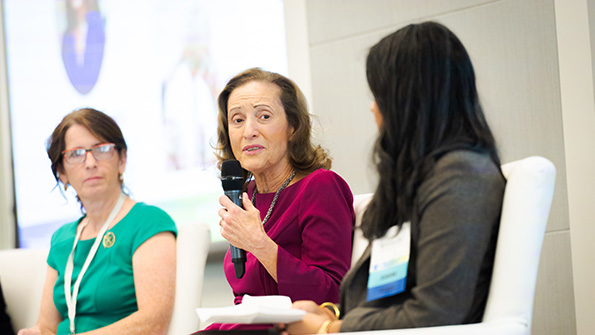

Afternoon Keynote
Remarks from Rep. Lauren Underwood (D-IL 14th District)
Watch the session recording, HERE
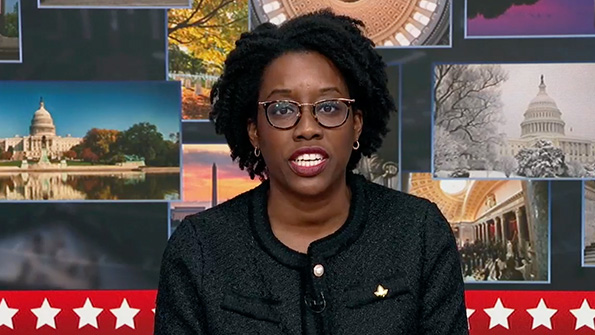

Planetary Health, The Big Picture
Human health relies on and is supported by natural systems. Learn about how actions to address the global threat of climate change can improve health on the local level.
Speakers
Ben Fulgencio-Turner, Director, Climate for Health
Marie Studer, PhD, Executive Director, Planetary Health Alliance
Cecilia Sorensen, MD, Director, Global Consortium on Climate and Health Education, Mailman School of Public Health, Columbia University
Watch the session recording, HERE
Collective Impact Working Session: Recommendations
The following are prioritized recommendations for what health professionals should do (and need) for effectively accelerating just and ambitious climate solutions.
- Persuade Healthcare Professionals to Be Change Agents: Encourage fellow healthcare professionals to deepen their understanding and participation and leverage their expertise to inspire climate action within their workplaces and communities.
- Patient Education + Empowerment: Equip patients with accessible knowledge and resources to understand the links between climate and health. Empower them with information on preventative care measures and how to take action to protect their well-being.
- Holistic Community Outreach: Engage with the community through accessible initiatives like community gardens and wellness/support groups. Foster mutual aid, coordination, and community events to strengthen climate resilience.
- Track What Works, Then Publicize It: Monitor climate solutions in your community and share the success stories publicly. Ensure narratives can be backed up with data, illustrate the tangible benefits of climate action, and make the actions and stories relatable and inspiring.
- Issue Customized Talking Points with Storytelling: Tailor your climate messaging to specific audiences using storytelling techniques to make the issues more relatable. Include clear “asks” for each audience to drive action.
- Keep Your Knowledge, Training + Education Current: Regularly educate yourself and fellow professionals about climate drivers, health outcomes, and evidence-informed actions to care for health and scale what works.
- Conduct + Apply Research: Pursue health and climate research that spans multiple disciplines and involves policymakers from the outset. Support research focused on local climate and pollutant exposure to inform actionable, community-specific solutions. Conduct and apply research on adaptation, behavior change, communication, and organizing for effective strategies to drive policy change.
- Coordinate + Respond to Disasters: Establish a system of coordination and mutual aid to respond effectively when severe weather and climate disasters occur.
- Catalyze Institutional Support: Advocate for institutions to prioritize climate action by harnessing health and climate information to convince them of the urgent need and opportunities to address climate change within their operations and policies.
- Partner with Corporations to Boost Capacity: Seek partnerships with corporations and healthcare institutions who can contribute funding, thought leadership, alliances, reach, and accountability in climate initiatives.
- Stimulate Large-Scale Behavior Change: Support strategies that encourage widespread behavior change, both within healthcare settings and the broader community, to reduce carbon impact, improve climate resilience, and benefit health (such as carbon free schools).
- Forge Clear Pathway for Education (Elementary to College+): Advocate for resources to support climate education at all levels, from elementary school through college and beyond. In parallel, promote workshops and program curriculums that instill climate awareness and action.
- Address Climate Denial: Leverage expertise of the health community and others to counter climate denial and misinformation. Establish platforms and messaging for redirecting misinformation.
By taking these impactful actions and addressing the identified needs, health professionals can accelerate local climate action and contribute significantly to building a healthier, more resilient community.
Success Showcase
Our work on climate matters and makes a difference. Celebrate and be inspired by leaders from across the country on their successful efforts to care for health through climate action.
Speakers
Lori Byron, MD, Chairperson, Montana Health Professionals for a Healthy Climate
Karen Florini, Vice President for Strategic Impact, Climate Central
Janice Hawkins RN, PhD, CNS, Assistant Professor, Old Dominion University
Reginald Vicks, COO, CrescentCare Community Health Center
Seema Wadhwa, Executive Director, Environmental Stewardship, Kaiser Permanente
Stefan Wheat, MD, Assistant Professor of Emergency Medicine, University of Washington
Watch the session recording, HERE
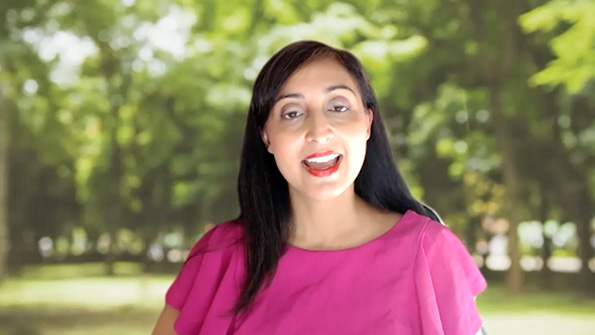

Pictured above: Seema Wadhwa
Moving Forward Working Session: Recommendations
The following are prioritized recommendations and strategies for collective action within the health field.
- Strengthen Local Coalitions for Action: Leverage existing coalitions, then strengthen by forming local coalitions that bring together clinicians, public health experts, family and children organizations, and other stakeholders beyond like-minded groups to deliberately seek local opportunities to advocate for climate solutions at the local and state level. Educate and develop advocates within these partnerships –particularly youth– to communicate effectively, amplify the collective voice, and influence change. Invest in community outreach, training, and grassroots organizing to accelerate the adoption of climate solutions at the local level.
- Expand Unconventional Partnerships + Alliances: Seek partnerships with unconventional organizations such as the Department of Transportation (DOT), the Department of Energy (DOE), barbers, hair stylists, and bartenders. Explore co-benefits, convening roles, and tell holistic stories about the health benefits of climate solutions.
- Follow an Equity-Centered Approach: Prioritize equity in all actions to ensure that marginalized voices are centered in decision-making processes and solutions. Promote community-driven solutions.
- Convene + Listen: Act as a convenor, bringing diverse stakeholders together to facilitate discussions and collaborate on efforts. Organize listening sessions with non-traditional partners to better understand their perspectives and needs.
- Coordinate Efforts in Climate + Health Movement: Coordinate efforts across organizations working on climate and health and foster intentional collaborations to maximize the impact of climate initiatives.
- Take Bold Action to Catalyze Climate Solutions: Launch a national engagement campaign to mobilize support and action for climate solutions at a broader scale. Locally, call for bold action to inspire interdisciplinary collaboration and coordination, such as initiatives to enhance climate resilience in school systems.
- Educate with Simple, Accessible + Inspiring Messaging: Develop and disseminate educational resources that inform peers and the public about climate change, equity, the benefits of solutions, and steps they can take to participate. Employ concise and simple messaging to shape a unified, positive, and empowering narrative around climate solutions. Ensure that all actions are grounded in evidence-based information with a strong emphasis on health equity.
- Share Resources + Knowledge: Share scalable models and resources that can be adopted by other organizations to replicate successful climate solutions. Share knowledge and insights between organizations and with the public, promoting transparency and information exchange.
- Translate and Apply Decision Science: Translate complex decision science into common language that resonates with diverse audiences to make climate solutions accessible to all. Ensure all actions are grounded in evidence-based information. Apply the science of behavioral change to make the climate action movement more effective. Emphasize the benefits of climate solutions.
These priorities demonstrate the breadth of opportunity for the health field to collaborate within and across sectors to create a collective, powerful force for equitable and ambitious climate action.
Closing + Next Steps
We wrapped up the day with gratitude, recap, and a commitment to moving forward together.
Watch the recording, HERE
Resources
- Climate for Health Ambassador Training: www.ClimateforHealth.org/Ambassadors
- Climate Rx Campaign: www.ClimateRx.org
- Mental Health and Our Changing Climate: Children and Youth Report 2023: https://ecoamerica.org/mental-health-and-our-changing-climate-children-and-youth-report/
- Climate for Health Resources/Research: www.ClimateforHealth.org/Resources
- American Climate Leadership Awards 2024 Landing Page: https://ecoamerica.org/american-climate-leadership-awards-2024/
- APHA Lesson Plan Toolkit: https://www.apha.org/Topics-and-Issues/Climate-Change/Education
- White House Climate Justice Toolkit:
- U.S. Department of Health and Human Services Climate Pledge: https://www.hhs.gov/climate-change-health-equity-environmental-justice/climate-change-health-equity/actions/health-sector-pledge/index.html
- HealthCare Without Harm Impact Calculator: https://calculatehealthimpact.org/
- Medical Society Consortium on Climate & Health State Workgroups: https://states.ms2ch.org/
